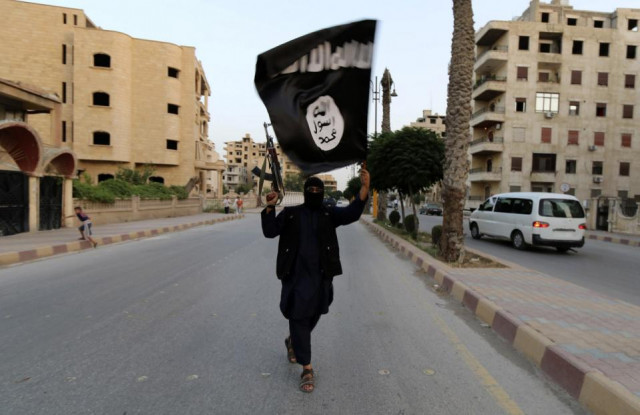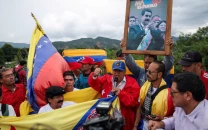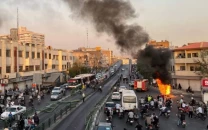IS accused of kidnapping 300 Syrian factory workers
The extremist group, which controls swathes of Syria and Iraq, has a history of mass abductions and killings

PHOTO: AFP
IS attacked the town of Dmeir, east of Damascus, after suffering a series of territorial losses at the hands of regime troops in recent weeks, including in the ancient city of Palmyra.
In another setback for the extremists, anti-government rebels were reported to have seized their main supply route to Turkey on Thursday.
Syria's official news agency SANA said the 300 people seized by IS were employees of Al-Badia cement factory.
"The company has informed the industry ministry that it hasn't been able to make contact with the kidnapped individuals," SANA said.
The extremist group, which controls swathes of Syria and Iraq, has a history of mass abductions and killings.
Residents of Dmeir, around 50 kilometres (30 miles) from Damascus, earlier reported that at least 250 workers at the plant had been missing since Monday.
The town is divided between IS control in the east and rebel control in the west, but several key positions around it, including a military airport and a power plant, are still in government hands.
The fresh fighting came ahead of a new round of peace talks due next week in Geneva, following a ceasefire between the regime and non-extremist rebels that has allowed Syrian forces to focus on fighting IS.
The talks are now due to begin on April 13, the same day as the regime is holding legislative elections, UN Syria envoy Staffan de Mistura said Thursday, delaying them by two days.
"I will be very much insisting and pushing for... a serious discussion on political transition" at the upcoming round, de Mistura told reporters in Geneva.
He said that before then he would complete a diplomatic tour, including stops in Damascus and Tehran, to "verify the international and regional stakeholders' position" in order to have "concrete results in the next round of talks".
The key stumbling block in the peace talks in Geneva is the fate of President Bashar al-Assad.
Syria's opposition has clung to its years-long demand that he leave power immediately, but the government has refused.
The Syrian Observatory for Human Rights, a Britain-based monitor, said the fighting in and around Dmeir was heavy but the extremists had not managed to gain significant ground.
"The most violent clashes are near the airport and the power plant, but IS has not entered either yet," Observatory director Rami Abdel Rahman said.
He said 20 members of regime forces and 35 IS fighters had been killed in the clashes.
A Dmeir resident told AFP on Thursday she could hear heavy shelling around the city and that residents were not daring to leave their homes.
"We have no electricity, we have no water. There are people fleeing from the eastern districts to the west," she said, asking not to be named out of fear for her safety.
Further north on the border with Turkey, rebel factions and Islamists took control of a border crossing as well as the town of Al-Rai after clashes with IS, according to the Observatory.
"This is the main and one of the last crossing points with Turkey," the monitor said.
Residents of battle-scarred Palmyra were meanwhile preparing to start returning to the city on Saturday after its recapture from the jihadists, officials said.
Most of Palmyra's pre-war population of 70,000 people fled west towards the city of Homs when the extremist group advanced on the city in May 2015.
Authorities this week began restoring power lines in the city and repairs to housing began on Wednesday, provincial governor Talal Barazi told the state news agency.
More than 270,000 people have been killed and millions have fled their homes since Syria's conflict erupted in March 2011.
The United Nations said Thursday it was aiming to begin a large-scale evacuation of wounded and sick people from four besieged Syrian towns within the next week.
Jan Egeland, who heads a UN-backed humanitarian taskforce for Syria, said "a very major" medical evacuation was planned for Madaya and Zabadani, two towns near Damascus blockaded by the regime and their allies, and Fuaa and Kafraya, besieged by rebels in Syria's northwest.
"All together it could be up to 500 people," he told reporters in Geneva.
The Doctors Without Borders (MSF) charity said the situation in Syria's besieged areas remained critical.
"The catalogue of horror continues virtually unabated in many besieged areas," said MSF Director of Operations Dr Bart Janssens.


















COMMENTS
Comments are moderated and generally will be posted if they are on-topic and not abusive.
For more information, please see our Comments FAQ